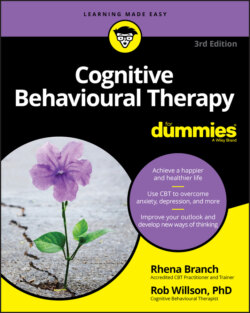Читать книгу Cognitive Behavioural Therapy For Dummies - Rob Willson - Страница 50
Conducting Surveys
ОглавлениеYou can use the clipboard and pen of the survey-taker in your endeavours to tackle your problems by designing and conducting your own survey. Surveys can be especially helpful in terms of getting more information about what the average person thinks, feels or does.
We suggest you have more than one type of behavioural experiment in your repertoire. Surveys are very useful if you believe that your thoughts, physical sensations or behaviours are out of the ordinary. If you have upsetting, intrusive thoughts and images or experience urges to say socially unacceptable things (symptoms typical of obsessive-compulsive disorder, OCD), feel pulled to the edge of high places (as in vertigo) or get a sense of impending doom when you’re not in a familiar place (symptoms associated with agoraphobia), you may think that you’re the only person who ever feels this way. Use surveys to see whether other people have the same thoughts and urges. You’ll probably discover that other people experience the same things as you do. You may also discover that the symptoms you experience are actually less of a problem than the way you currently deal with them.
Henry suffers from OCD. His particular obsessional problem is related to frequent intrusive images of harm coming to his family. Henry’s convinced that he’s the only person in the world who gets such unpleasant and unwanted images entering his mind. Henry concludes that there’s something very different and wrong about him because he has such images. He tests his theory about his abnormality by conducting the following survey:
Describe the problem. Henry’s convinced that his intrusive thoughts about his family being hurt in a car accident are unusual and mean that he has to protect his family by changing the image in his mind to them being happy at a party.
Formulate a prediction. Henry comes up with the prediction ‘No one will admit to having the kind of thoughts I have’. He rates his strength of belief as 70 per cent.
Execute an experiment. Henry tests his perception that his images are abnormal by devising a checklist of intrusive thoughts and asking his friends and family members to tick any that they experience.
Examine the results. Henry’s surprised at the variety of thoughts that people report entering their minds. Henry concludes that perhaps his images aren’t so abnormal after all. He re-rates his conviction in his original prediction as 15 per cent. Henry also learns that other people simply discount their unpleasant images and don’t worry that they mean anything sinister.
Charlotte worries a lot about her health and the possibility of developing a life-threatening illness. Sometimes, Charlotte notices funny sensations in her body and instantly interprets them as signs of an undiagnosed disease. Charlotte assumes that no one else gets unusual bodily sensations from time to time.
Describe the problem. Charlotte worries that the bodily sensations she experiences are a sign of disease. She’s unsatisfied by frequent reassurance from her family doctor and husband. Charlotte’s problems are based partly on two ideas:Physical sensations must have a clear medical explanation.Any sensible person would seek an immediate explanation for the physical sensations she’s currently experiencing.
Formulate a prediction. Charlotte makes the following prediction: ‘Most people won’t have many physical sensations, and if they do they go immediately to see their doctor.’ She rates her strength of conviction in this idea as 80 per cent.
Execute an experiment. Charlotte devises a list of physical sensations, including many of those that she worries about herself. Her checklist requires people to tick whether they’ve ever experienced the sensation and to indicate how long they might leave it before consulting their doctor about such sensations. She asks ten people to fill out her questionnaire.
Examine the results. Charlotte’s shocked that many people reported experiencing some of the bodily sensations she described and stated that they’d leave going to their doctor for several days, or even weeks. Some people reported that they probably wouldn’t bother seeing their doctor at all regarding some sensations. Charlotte concludes that perhaps she’s worrying too much about her health and plans to delay consulting her doctor when she next has unexplained physical sensations. Her strength of belief in her original prediction reduces to 30 per cent.
